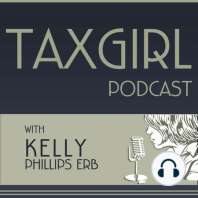31 min listen
52: Child Tax Credit Explained: 2021 Tax Changes Affecting American Families
FromTaxgirl Podcast
ratings:
Length:
31 minutes
Released:
Jul 6, 2021
Format:
Podcast episode
Description
There are important tax changes coming this summer for families. Specifically, the child tax credit will enable families to get advanced payments. This is a change from prior years where the credit was calculated and paid out at tax time. The credit is not a new credit, it’s an enhanced credit as part of President Biden’s American Rescue Plan, signed into law in March 2021. The purpose of the child tax credit is to help lift families out of poverty, but like many tax provisions, it can be complicated. On today’s episode of the Taxgirl podcast, Kelly is joined by Elaine Maag and Professor Francine Lipman to explain the 2021 tax changes for families, especially the child tax credit. Elaine is a Principal Research Associate at the Brookings Institution Tax Policy Center, where she studies income support programs with a particular interest in how tax policy supports low and middle income families. She is a member of The Tax Policy and Poverty Research Network, and a member of The National Academy’s Insurance Panel on assured income. Professor Lipman teaches tax courses at the Boyd School of Law, UNLV. She has previous experience as an accountant, a lawyer, a teacher, and a scholar. She is an elected member of the American Law Institute, The American College of Tax Council, and The American Bar Foundation. Professor Lipman is also an Editor and former Committee Chair for the tax section of The American Bar Association. Listen to Kelly, Elaine, and Professor Lipman talk about the child tax credit: What is new about the child tax credit, how is it different from the credit we know and love from years prior? The margin of increase in credit payments per child. How will this change affect families that don’t traditionally file a tax return? How to get in touch with the IRS regarding the change via toll free phone line or online portal. In terms of the new advance monthly payments, do we know what will happen if those payments don’t start even when you’re entitled to them? The IRS will be creating a separate user portal to update personal information. Does the IRS know how it will be handling disputes regarding who gets to claim dependents with this change? If your income is under $40K annually and you’re a single parent, you’re probably within the safe harbor. How many of these changes apply only for 2021, and which ones are here to stay? In the wake of the pandemic, why are some of these 2021 tax changes only temporary? There’s been a lot of criticism on the tax professional side about prioritization of projects and the timeline that payments are delivered. How is the IRS encouraging low income families and serial non-filers to begin filing this year? In comparison to the stimulus check program, how is the child tax credit different and where does it show up on a tax return? The credit will be paid half in advance and then reconciled on the return, what sources are recommended for learning more information about the tax credit? More about Kelly Phillips Erb: Kelly is the creator and host of the Taxgirl podcast series. Kelly is a practicing tax attorney with considerable experience and knowledge. She works with taxpayers like you every day. One of the things that she does is help folks out of tax jams, and hopefully, keep others from getting into them. Links mentioned: Kelly’s Website – TaxgirlFAQ’s from the IRS -- Child Tax CreditElaine - Tax Policy CenterProfessor Lipman’s Bio -- UNLV
Released:
Jul 6, 2021
Format:
Podcast episode
Titles in the series (90)
3: Paying & Managing Sales Taxes In A Post-Wayfair World by Taxgirl Podcast
